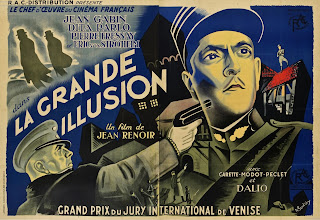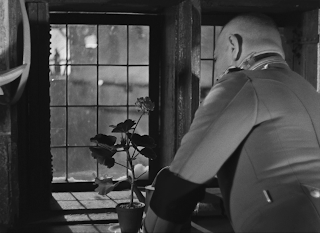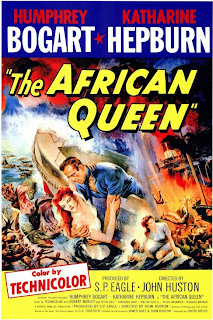La Grande Illusion (1937)
By 1937 French filmmaker Jean Renoir was 43 years old and had made 21 films (a number of which were short films), going right back to the halcyon silent days of 1924. Despite moderate success in his homeland with films such as La Chienne (1931) and Toni (1935), his name was still virtually unknown outside of France. In 1937 all that changed with the release of La Grande Illusion, winning the director numerous accolades, including the distinction of being the first foreign film to be nominated for the Academy Award for Best Picture. As the years have gone on its reputation has only grown and it is now widely considered one of the greatest films ever made, and has been the subject of countless articles, reviews and books.
The film is set during the First World War (then still known as the Great War), and begins when two French aviators, Captain de Boieldieu (Pierre Fresnay) and Lieutenant Maréchal (Jean Gabin) are shot down and captured by the respected German aviator Captain von Rauffenstein (played by the celebrated silent director Eric von Stroheim, providing one of the film's best performances). Boieldieu and Maréchal are commended by Rauffenstein for their bravery, and he invites them to join him and the other officers for lunch. Despite being enemies Boieldieu and Rauffenstein find they get on well due to their shared aristocratic heritage. The French prisoners are then transferred to a POW camp populated with French, British and Russian officers from a wide variety of different backgrounds and social classes. There they meet the likable Jewish banker Rosenthal (Marcel Dalio) and his friends, who reveal to the Frenchmen that they have been secretly digging a tunnel out of the camp which they expect to complete within a few weeks.
The prisoners are treated well by the Germans, and during a vaudeville-style performance by the French POWs at the camp, news reaches them that the French have managed to retake Fort Douamont in the Battle of Verdun. Maréchal interrupts the show and encourages the troops to join him in a rendition of the French national anthem. His actions lead him to spending time in solitary confinement, though as he is eventually released he learns that the escape tunnel is almost finished.
Just as the prisoners are preparing their escape they learn that they are to be immediately transferred to Wintersborn, a camp high in the mountains which is coincidentally run by Major von Rauffenstein, who has been badly injured in battle but promoted to oversee the camp, a role he sees a little more than that of a "policeman". Though Rauffenstein assures the men that escape from the remote, heavily guarded castle is impossible, Boieldieu, Maréchal and Rosenthal eventually work out an ingenious plan to escape - though it requires one of the men to stay behind and act as a decoy - a role Boieldieu selflessly accepts.
In the hands of another filmmaker, La Grande Illusion could easily have become just another wartime prisoner-escape film. But in Renoir's hands he gives the film so many different dimensions that you could watch it a dozen times and see something in a different way on each viewing. To Renoir this was a personal film, with the director even going so far as to lend Jean Gabin his own personal uniform from the war to wear during filming, and his involvement in the 1958 re-release suggests that this was a film he was very satisfied with. Renoir had served as a reconnaissance pilot in World War I, and this first-hand experience certainly seems to have tainted his opinion of war as an ultimately futile exercise. Indeed part of the reason for the film's title comes from his opinion that the idea that war can actually make things better is all just a "grand illusion".
La Grande Illusion was also produced at a pivotal point in history. The First World War had come to an end nineteen years earlier, and though there had been the occasional anti-war film showing the Germans in a humane light (most famously in 1930's All Quiet on the Western Front), the harsh memory was still too fresh for many filmmakers to wish to tackle the controversial subject. But more importantly is that this was released just two years before Germany invaded Poland and ignited World War II. Germany was frantically re-arming and, though few in Europe understandably wanted to believe it, the storm clouds were gathering on the horizon. So Renoir's film occupies a unique vantage point where it carries the weight of the past, but is also on the precipice of another global war. Notably, where All Quiet on the Western Front depicts the horrific human cost of the war by showing trench warfare and large-scale battle on no-man's land, La Grande Illusion depicts no on-camera fighting or combat scenes at all. At the time of its release, there was some criticism over this, but it would not have helped the storyline at all to include any such scenes - this is a story about a small group of men and how they refuse to let the fact that the odds are overwhelmingly stacked against them dampen their spirits at all. Even when Maréchal is put in solitary confinement and finds the experience almost unbearable, he doesn't let it subdue him, and emerges ready to attempt an escape.
Renoir also uses the film to comment on what he believed was another "grand illusion" - that of social class. There are clear divides in La Grande Illusion, as shown by the kinship struck up by the German Rauffenstein and his prisoner the French Boieldieu, both of whom are upper class and able to converse efficiently in French, German and English. They switch language often in order to speak discretely to each other, and discuss their shared belief that after the war the social structure would be returned to the state it was before 1914 and that their kind would once again triumph. To Renoir, this was again a "grand illusion." Things would never be as they were. To effectively show the changes in language Renoir utilised a method that, though simple, had not really been done before in cinema - he had the actors speak in the language in which they were scripted to speak, and simply subtitled the non-French dialogue. This means the audience doesn't get confused, it's always clear what's going on, as well as giving the film an authenticity that couldn't have been achieved any other way.
I could go on about numerous other inflections that Renoir has filled La Grande Illusion with (the Jewish character countering Hitler's anti-Semitism; the black French officer) but as this is fundamentally a war film, I've concentrated on the points pertinent to that. This really is a formidable film, one which should be watched multiple times to appreciate just how proficient Renoir was. It would have been too easy to try and cram so much social commentary into the film that it just collapsed under its own weight, but its testament to his ability as a master filmmaker that he was able to infuse the film with so many dimensions - but the impressive thing is they are only there if you want to look for them. If you want to view La Grande Illusion as a simple film of prisoners trying to escape from the Germans, it's all here and it's a great story. Enjoy it. But there's so much more going on here that it seems almost wrong to not consider the wider notions at work. The "grand illusion" indeed.
The film is set during the First World War (then still known as the Great War), and begins when two French aviators, Captain de Boieldieu (Pierre Fresnay) and Lieutenant Maréchal (Jean Gabin) are shot down and captured by the respected German aviator Captain von Rauffenstein (played by the celebrated silent director Eric von Stroheim, providing one of the film's best performances). Boieldieu and Maréchal are commended by Rauffenstein for their bravery, and he invites them to join him and the other officers for lunch. Despite being enemies Boieldieu and Rauffenstein find they get on well due to their shared aristocratic heritage. The French prisoners are then transferred to a POW camp populated with French, British and Russian officers from a wide variety of different backgrounds and social classes. There they meet the likable Jewish banker Rosenthal (Marcel Dalio) and his friends, who reveal to the Frenchmen that they have been secretly digging a tunnel out of the camp which they expect to complete within a few weeks.
The prisoners are treated well by the Germans, and during a vaudeville-style performance by the French POWs at the camp, news reaches them that the French have managed to retake Fort Douamont in the Battle of Verdun. Maréchal interrupts the show and encourages the troops to join him in a rendition of the French national anthem. His actions lead him to spending time in solitary confinement, though as he is eventually released he learns that the escape tunnel is almost finished.
Just as the prisoners are preparing their escape they learn that they are to be immediately transferred to Wintersborn, a camp high in the mountains which is coincidentally run by Major von Rauffenstein, who has been badly injured in battle but promoted to oversee the camp, a role he sees a little more than that of a "policeman". Though Rauffenstein assures the men that escape from the remote, heavily guarded castle is impossible, Boieldieu, Maréchal and Rosenthal eventually work out an ingenious plan to escape - though it requires one of the men to stay behind and act as a decoy - a role Boieldieu selflessly accepts.
In the hands of another filmmaker, La Grande Illusion could easily have become just another wartime prisoner-escape film. But in Renoir's hands he gives the film so many different dimensions that you could watch it a dozen times and see something in a different way on each viewing. To Renoir this was a personal film, with the director even going so far as to lend Jean Gabin his own personal uniform from the war to wear during filming, and his involvement in the 1958 re-release suggests that this was a film he was very satisfied with. Renoir had served as a reconnaissance pilot in World War I, and this first-hand experience certainly seems to have tainted his opinion of war as an ultimately futile exercise. Indeed part of the reason for the film's title comes from his opinion that the idea that war can actually make things better is all just a "grand illusion".
La Grande Illusion was also produced at a pivotal point in history. The First World War had come to an end nineteen years earlier, and though there had been the occasional anti-war film showing the Germans in a humane light (most famously in 1930's All Quiet on the Western Front), the harsh memory was still too fresh for many filmmakers to wish to tackle the controversial subject. But more importantly is that this was released just two years before Germany invaded Poland and ignited World War II. Germany was frantically re-arming and, though few in Europe understandably wanted to believe it, the storm clouds were gathering on the horizon. So Renoir's film occupies a unique vantage point where it carries the weight of the past, but is also on the precipice of another global war. Notably, where All Quiet on the Western Front depicts the horrific human cost of the war by showing trench warfare and large-scale battle on no-man's land, La Grande Illusion depicts no on-camera fighting or combat scenes at all. At the time of its release, there was some criticism over this, but it would not have helped the storyline at all to include any such scenes - this is a story about a small group of men and how they refuse to let the fact that the odds are overwhelmingly stacked against them dampen their spirits at all. Even when Maréchal is put in solitary confinement and finds the experience almost unbearable, he doesn't let it subdue him, and emerges ready to attempt an escape.
Renoir also uses the film to comment on what he believed was another "grand illusion" - that of social class. There are clear divides in La Grande Illusion, as shown by the kinship struck up by the German Rauffenstein and his prisoner the French Boieldieu, both of whom are upper class and able to converse efficiently in French, German and English. They switch language often in order to speak discretely to each other, and discuss their shared belief that after the war the social structure would be returned to the state it was before 1914 and that their kind would once again triumph. To Renoir, this was again a "grand illusion." Things would never be as they were. To effectively show the changes in language Renoir utilised a method that, though simple, had not really been done before in cinema - he had the actors speak in the language in which they were scripted to speak, and simply subtitled the non-French dialogue. This means the audience doesn't get confused, it's always clear what's going on, as well as giving the film an authenticity that couldn't have been achieved any other way.
I could go on about numerous other inflections that Renoir has filled La Grande Illusion with (the Jewish character countering Hitler's anti-Semitism; the black French officer) but as this is fundamentally a war film, I've concentrated on the points pertinent to that. This really is a formidable film, one which should be watched multiple times to appreciate just how proficient Renoir was. It would have been too easy to try and cram so much social commentary into the film that it just collapsed under its own weight, but its testament to his ability as a master filmmaker that he was able to infuse the film with so many dimensions - but the impressive thing is they are only there if you want to look for them. If you want to view La Grande Illusion as a simple film of prisoners trying to escape from the Germans, it's all here and it's a great story. Enjoy it. But there's so much more going on here that it seems almost wrong to not consider the wider notions at work. The "grand illusion" indeed.










Comments
Post a Comment